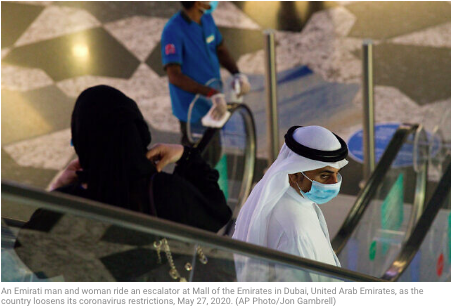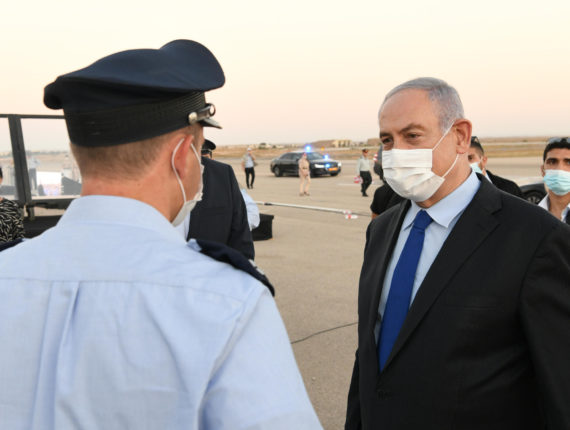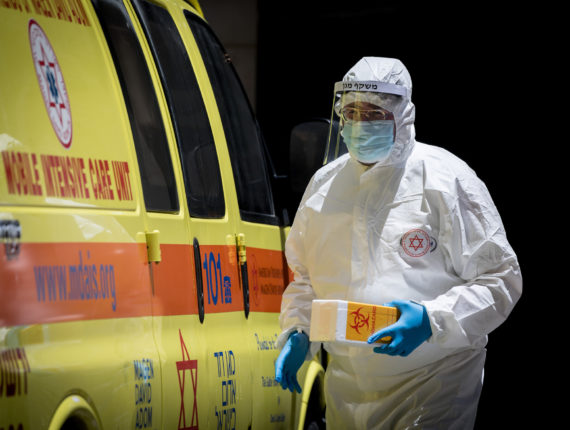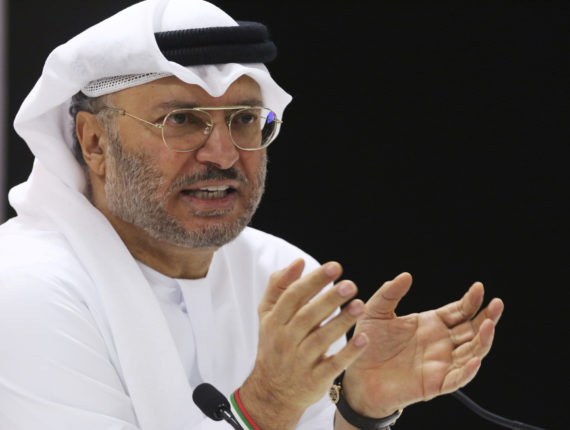
Times of Israel
June 26, 2020
Abu Dhabi mum on state-to-state collaboration with Israel on fighting coronavirus, despite PM declaring imminent announcement from both countries’ health ministries

Private companies from Israel and the United Arab Emirates will join forces to research and develop technology to fight the coronavirus pandemic, the two countries, which have no official diplomatic ties, said Thursday.
Prime Minister Benjamin Netanyahu broke the news of an impending collaboration between the Jewish state and the Arab Gulf country, saying an announcement from the two governments’ health ministries was imminent.
The UAE confirmed a joint project between private companies, but notably did not mention the government collaboration announced by Netanyahu.
“In a few moments, the health ministers of the United Arab Emirates and the State of Israel will announce cooperation in the fight against the coronavirus,” Netanyahu said at a graduation ceremony for the Israel Air Force’s pilot course.
“This cooperation will be in research and development, and technology, fields which could improve the health security of the entire region. This is the result of continuous and intensive contacts over the past few months. It will be a blessing for many in our region,” Netanyahu said.
In a speech that also focused on threats posed to Israel from Iran, Syria and Lebanon, he added: “The stronger we are, the more powerful we are — we deter our enemies and bring our friends closer.”

Prime Minister Benjamin Netanyahu at an IAF pilots’ course graduation ceremony, June 25, 2020 (Amos Ben-Gershom / GPO)
Hours later the Emirati state news agency WAM announced an initiative between private firms, but did not confirm official government collaboration between Israel and the UAE.
The names of the companies were not immediately revealed and it was unclear whether there would be any official state-to-state cooperation.
“Two private companies in the UAE sign[ed] an agreement with two companies in Israel to develop research and technology to fight COVID-19,” WAM said.
“This scientific and medical agreement forms part of constructive cooperation aimed at addressing the COVID-19 pandemic to safeguard the health of the region’s peoples,” WAM said. “As a result of the pandemic’s spread worldwide, it is imperative to place the protection of humanity at the forefront of global action to overcome this unprecedented crisis.”
Hend al-Otaiba, director of strategic communications at the UAE foreign ministry, likewise reported that an agreement had been signed by firms in Israel and the UAE to develop research and technology to fight the virus.
“In light of strengthening international cooperation in the fields of research, development & technology in service of humanity, two private companies in UAE sign an agreement with two companies in Israel to develop research technology to fight COVID-19,” he said.
Israel’s Health Ministry confirmed a private collaboration, saying “companies from the private sector in the UAE will sign with Israeli companies agreements for the development of research and technology pertaining to the war against the coronavirus.”
“Scientific and medical cooperation bridges historical and political challenges in the region,” Chezy Levy, the ministry’s new director-general, said in a statement.
Health Minister Yuli Edelstein did not make any announcement about the development.

A Magen David Adom worker arrives to test a patient with symptoms of coronavirus in Jerusalem on June 23, 2020 (Yonatan Sindel/Flash90)
Channel 12 news reported that Mossad chief Yossi Cohen helped broker the new agreement.
A Thursday report by the Ynet news site said that a shipment of 100,000 coronavirus test kits delivered to Israel earlier this year by the Mossad spy agency from an undisclosed country came from the UAE.
Jerusalem and Abu Dhabi have no formal diplomatic ties, but have been cooperating increasingly openly after years of rumored back-channel discussions between them over their mutual enmity of Iran.
Tensions between Israel and its neighbors have climbed in recent weeks, however, due to Netanyahu’s vows to begin annexing sections of the West Bank beginning July 1.
While not acknowledging Israel diplomatically, Emirati officials have in recent years allowed Israeli officials to visit and the Israeli national anthem was played after an athlete won gold in an Abu Dhabi judo tournament. Israel also has a small mission representing its interests at the International Renewable Energy Agency in Abu Dhabi.
In May and June the UAE’s Etihad Airlines landed its first two direct flights from Abu Dhabi to Israel, carrying shipments of medical supplies to assist the Palestinians in coping with the coronavirus pandemic. The Palestinian Authority rejected the aid, saying it was an excuse for a step toward the normalization of ties between Israel and the Gulf states.

Emirati Minister of State for Foreign Affairs Anwar Gargash speaks to journalists in Dubai, United Arab Emirates, Monday, June 18, 2018. (AP/Jon Gambrell)
Last week, the UAE’s Minister of State for Foreign Affairs Anwar Gargash called for increased cooperation with Israel. He said there was no reason not to cooperate with Israel on efforts to bring medical aid to Palestinians suffering from the coronavirus pandemic.
Last month a senior official at one of the country’s leading hospitals said several states in the Arab Gulf were actively engaged in cooperation with Israel’s health system.
Top representatives from Bahrain and the UAE have been in regular touch with the Sheba Medical Center since before the current health crisis, said Yoel Hareven, who heads the hospital’s international division. In March, a high-ranking member of the Emirati royal family privately visited the hospital in Ramat Gan and has since remained in weekly contact, Hareven said.
The Gulf states recognize how powerful and innovative Israel’s health sector is and are increasingly willing to say so openly, Hareven added, calling it “the beginning of a very fascinating journey — for the entire Israeli public, not only for the medical field or Sheba Medical Center.”
Rabbi Marc Schneier, who has extensive ties in the Gulf and helped establish the connection between Sheba and the Bahraini government, said many decision-makers in the Gulf envision a partnership that would marry the Arab countries’ economic wherewithal with Israel’s brain trust, he said.
“I’ve heard this repeatedly from my friends in the Gulf: COVID-19 is a real opportunity for joint cooperation.”
Earlier this month, UAE Minister of State Yousef Al-Otaiba, who is also the country’s ambassador to the US, wrote a first-ever op-ed for an Israeli newspaper by a Gulf diplomat, in which he acknowledged that Israel and much of the Arab world have grown closer in recent years and expressed hope that such cooperation in a wide range of areas would deepen in the future.
But he warned Jerusalem against its plan to unilaterally annex parts of the West Bank, saying such a move would destroy any hopes for further rapprochement between the Jewish state and the Arab world.
Al-Otaiba noted that much of the Arab world “would like to believe Israel is an opportunity, not an enemy. We face too many common dangers and see the great potential of warmer ties. Israel’s decision on annexation will be an unmistakable signal of whether it sees it the same way.”
Israel has confirmed 22,400 cases of coronavirus, including 309 deaths, since reporting its first infection in February, and is now facing a new spike.
The UAE has officially reported more than 45,000 cases, including 302 deaths.
Copyright © 2025 Foundation For Ethnic Understanding. All rights reserved. | Privacy Policy